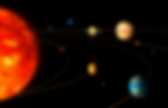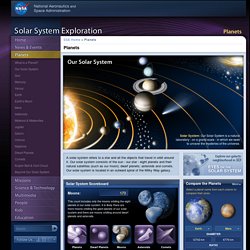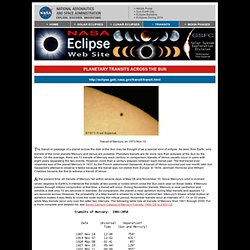

Planets. Planets: The planet count in our solar system has gone as high as 15 before new discoveries prompted a fine tuning of the definition of a planet.

The most recent change was in 2006 when scientists reclassified Pluto as a new kind of object - a dwarf planet. Dwarf Planets: This new class of worlds helps us categorize objects that orbit the Sun but aren't quite the same as the rocky planets and gas giants in our solar system. There could be hundreds more of these small worlds far out there waiting to be discovered. Moons: This count includes only the moons orbiting the eight planets in our solar system. Asteroids: New asteroids are discovered on an almost daily basis. Comets: Orbiting spacecraft such as SOHO have raised this tally in recent years by catching the comets as they plunge toward the Sun - and sometimes vaporize. Scientist Claims Our Solar System Evicted A Planet So Earth Could Survive. Colorado scientist David Nesvorny was running solar system evolutionary simulations recently when he realized that during 6,000 different simulations the Earth couldn’t survive during the system’s early years based on the current planetary count.

Once Nesvorny added another planet to the system however Earth survived as expected. According to his work our solar system at one point had a ninth planet, a gas giant that was nudged out of the system billions of years ago to make room for Earth’s survival. According to the Mother Nature Network “gas giant number five” started off bound together with Saturn and Jupiter and pushed out lighter planets including Neptune and Uranus eventually to be pushed out of the system on its own after a collision with Jupiter. According to his work David said the planet was likely orbiting about 15 times further from the sun than our own planet. Planetary Retrogrades.
Planetary Transits Page. Transit of Mercury on 1973 Nov 10.

The transit or passage of a planet across the disk of the Sun may be thought of as a special kind of eclipse. As seen from Earth, only transits of the inner planets Mercury and Venus are possible. Planetary transits are far more rare than eclipses of the Sun by the Moon. On the average, there are 13 transits of Mercury each century. In comparison, transits of Venus usually occur in pairs with eight years separating the two events. At the present time, all transits of Mercury fall within several days of May 08 and November 10. To determine whether a transit of Mercury is visible from a specific geographic location, it is simply a matter of calculating the Sun's altitude and azimuth during each phase of the transit using information tabulated in the Seven Century Catalog of Mercury Transit.
Photograph of the Transit of Venus on 1882 Dec 06. Because Venus's orbit is considerably larger than Mercury's orbit, transits of Venus are much rarer. Maor, Eli. The Nine Planets Solar System Tour. Planets. Planets PLANETS: New Worlds, New Discoveries NASA is at the leading edge of a journey of scientific discovery that promises to reveal new knowledge of our Solar System’s content, origin, evolution and the potential for life elsewhere.

NASA Planetary Science is engaged in one of the oldest of scientific pursuits: the observation and discovery of our solar system’s planetary objects. With an exploration strategy based on progressing from flybys, to orbiting, to landing, to roving and finally to returning samples from planetary bodies, NASA advances the scientific understanding of the solar system in extraordinary ways, while pushing the limits of spacecraft and robotic engineering design and operations. Since the 1960s, NASA has broadened its reach with increasingly sophisticated missions launched to a host of nearby planets, moons, comets and asteroids. Our Solar System is a place of beauty and mystery, incredible diversity, extreme environments, and continuous change. Our Solar System.